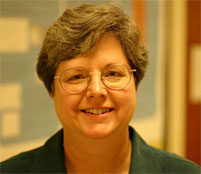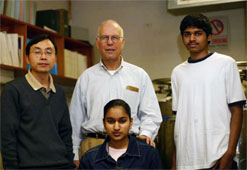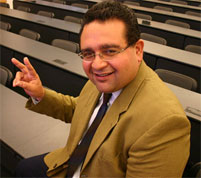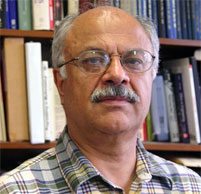Exceptional Poly Professors Recognized for Educational Excellence
Distinguished Teacher Award:
Mary Cowman, Department of Chemical and Biological Sciences
 |
| Professor Mary Cowman |
Professor Cowman is internationally recognized as a leader in the study of the structure and properties of biologically important polysaccharides, but here at Poly she is known for her sense of humor and commitment to students. She is one of those teachers who has a long-term impact on her students, developing friendships that last for decades. With an astute sense of understanding, she challenges students when they are capable of more, and nurtures them when they need help.
According to Bruce Garetz Professor & Head of the Department of Chemical & Biological Sciences, Professor Cowman is an unsung hero of the department, teaching both undergraduate and graduate biochemistry at Poly with passion and commitment for the past twenty years. In addition, she has advised PhD research students in biochemical research and served as a mentor to undergraduate pre-med students, helping many get into medical school. Never reluctant to try new ways to enhance students' learning, Professor Cowman was the first in the department to use computer animations of biochemical processes in her lectures, including 3-D projections of complex molecules.
Jacobs Excellence in Education Award:
Mark Green, Department of Chemical and Biological Sciences |
| Back row, left to right: Zhihua Lu, Mark M. Green, Sriram Manivannan Front: Rohanie Devi Lochan |
To further advance the art of teaching chemistry, Dr. Green wrote the widely acclaimed book, “Organic Chemistry Principles and Industrial Practice†with co-author Harold Wittcoff. Written in a conversational tone, the book incorporates a storytelling approach to discovering the principles of organic chemistry. According to a review in the Journal of Chemical Education, the book excels, “providing a wealth of information, insight, and inventive teaching.†Currently, Professor Green is using his unique instruction methods to teach students interested in the biological sciences by demonstrating how the principles of organic chemistry can be discovered by learning how the body translates the food we eat into the energy that sustains us.
Magued Iskander, Department of Civil Engineering
 |
| Professor Magued Iskander |
Professor Iskander seeks to provide students with the necessary theoretical foundation for life-long learning. By supporting independence, critical thinking, and creativity, he ensures that his students are prepared for the demanding challenges that lay ahead in the evolving world of civil engineering. As the world's population continues to escalate, particularly in urban areas, the demand for infrastructure renewal will provide exciting opportunities for civil engineers.
Realizing that civil engineering education and research must evolve to meet the needs of the 21st century, Professor Iskander developed and adopted a modern M.Sc. curriculum in Civil Engineering. The new program promotes interdisciplinary learning and addresses the reality that civil engineering today is more concerned with renewal and redevelopment than new construction. Working collaboratively with graduate and undergraduate students, Dr. Iskander developed a course that combines elements from civil, mechanical, and electrical engineering together with management concepts. The new course, “Instrumentation, Monitoring, and Condition Assessment of Civil Infrastructure,†is so unique that no suitable textbooks were available. To overcome this challenge, Professor Iskander and his students (Nerik Yakubov, Edwin Yu, David Chen, and Ilya Zarankin) carefully researched available materials to create learning modules making use of real life examples, incorporating humor whenever possible. Student evaluations of the course revealed their efforts were worth it - virtually all the students remarked that the course made them appreciate interdisciplinary education and explore ideas that they had not considered before.
 |
| Professor Said Nourbakhsh |
Professor Nourbakhsh was honored for his commitment to making sure Poly engineering students have access to a state-of-the-art Materials Science Laboratory. Lab work is an integral part of the mechanical engineering curriculum, so Dr. Nourbakhsh designed and built a modern, multimedia Materials Science Laboratory along with an interactive, illustrative lab manual. The laboratory contains up to date engineering tools including: sample preparation equipment, optical and scanning electron microscopes, X-ray diffractometer, interactive software for building virtual crystal structures and determining their diffraction pattern, impact, fatigue, and tensile testing equipment. With access to these tools, Dr. Nourbakhsh's students will be well equipped to meet the challenges of the dynamic world of mechanical engineering.
Professor Nourbakhsh's commitment to students is not limited to the classroom — he also served as a faculty advisor to a team of seven engineering students who designed and built a radio-controlled airplane entered in the SAE's Aero Design East Competition in April 2006.




